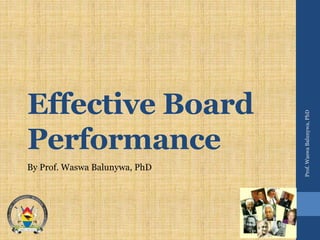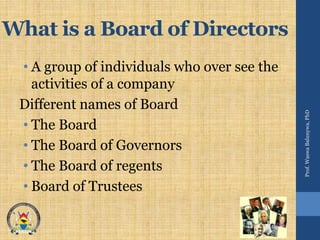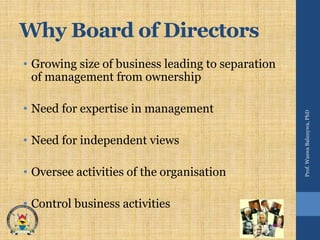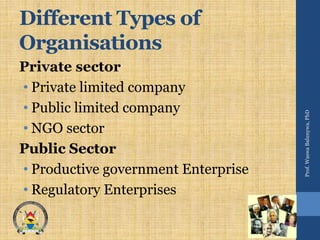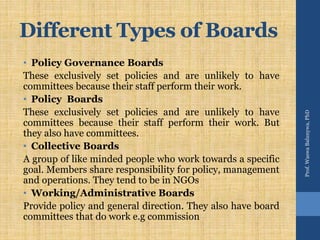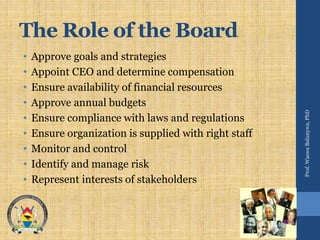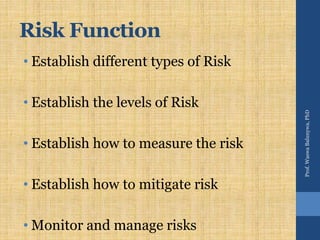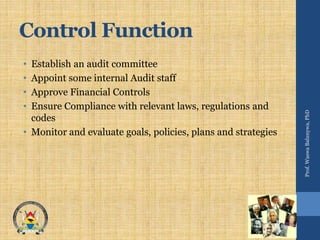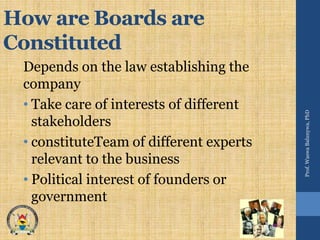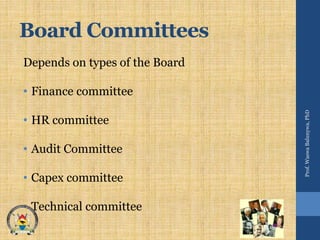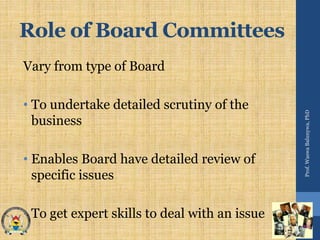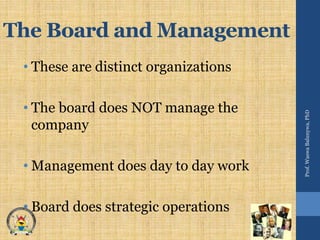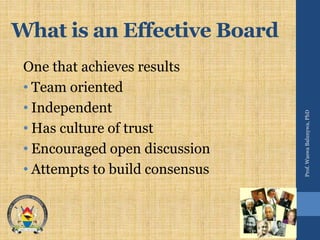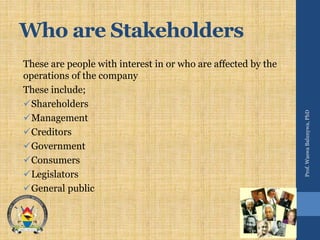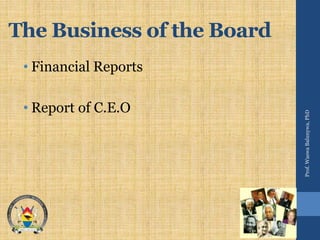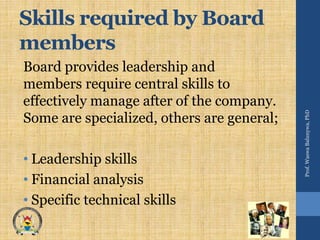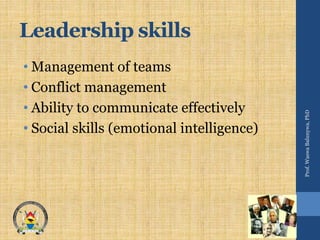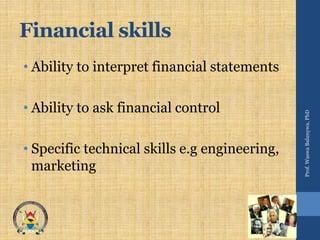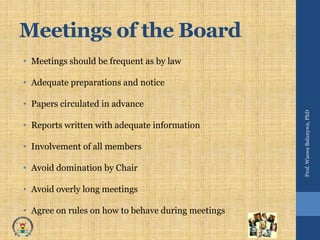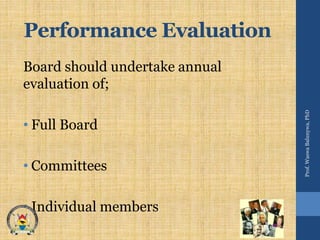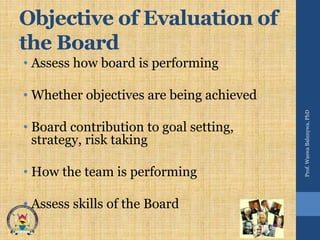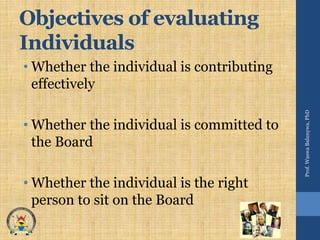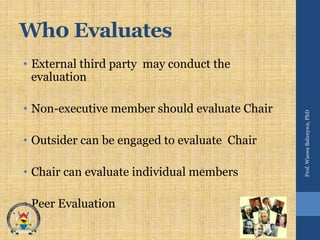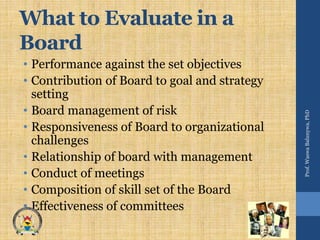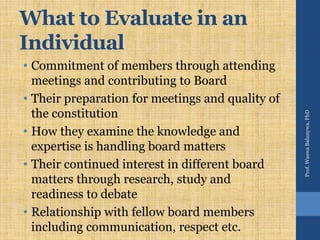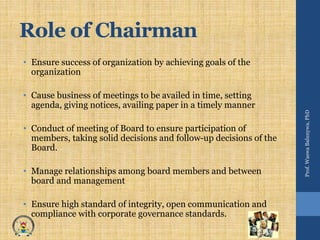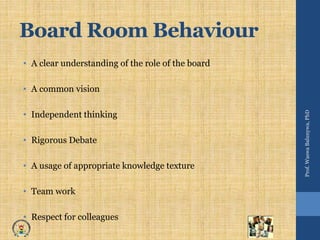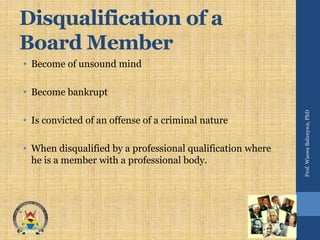Effective board performance
- 1. Effective Board Performance By Prof. Waswa Balunywa, PhD Prof.WaswaBalunywa,PhD
- 2. What is a Board of Directors ŌĆó A group of individuals who over see the activities of a company Different names of Board ŌĆó The Board ŌĆó The Board of Governors ŌĆó The Board of regents ŌĆó Board of Trustees Prof.WaswaBalunywa,PhD
- 3. Why Board of Directors ŌĆó Growing size of business leading to separation of management from ownership ŌĆó Need for expertise in management ŌĆó Need for independent views ŌĆó Oversee activities of the organisation ŌĆó Control business activities Prof.WaswaBalunywa,PhD
- 4. Different Types of Organisations Private sector ŌĆó Private limited company ŌĆó Public limited company ŌĆó NGO sector Public Sector ŌĆó Productive government Enterprise ŌĆó Regulatory Enterprises Prof.WaswaBalunywa,PhD
- 5. Different Types of Boards ŌĆó Policy Governance Boards These exclusively set policies and are unlikely to have committees because their staff perform their work. ŌĆó Policy Boards These exclusively set policies and are unlikely to have committees because their staff perform their work. But they also have committees. ŌĆó Collective Boards A group of like minded people who work towards a specific goal. Members share responsibility for policy, management and operations. They tend to be in NGOs ŌĆó Working/Administrative Boards Provide policy and general direction. They also have board committees that do work e.g commission Prof.WaswaBalunywa,PhD
- 6. The Role of the Board ŌĆó Approve goals and strategies ŌĆó Appoint CEO and determine compensation ŌĆó Ensure availability of financial resources ŌĆó Approve annual budgets ŌĆó Ensure compliance with laws and regulations ŌĆó Ensure organization is supplied with right staff ŌĆó Monitor and control ŌĆó Identify and manage risk ŌĆó Represent interests of stakeholders Prof.WaswaBalunywa,PhD
- 7. Risk Function ŌĆó Establish different types of Risk ŌĆó Establish the levels of Risk ŌĆó Establish how to measure the risk ŌĆó Establish how to mitigate risk ŌĆó Monitor and manage risks Prof.WaswaBalunywa,PhD
- 8. Control Function ŌĆó Establish an audit committee ŌĆó Appoint some internal Audit staff ŌĆó Approve Financial Controls ŌĆó Ensure Compliance with relevant laws, regulations and codes ŌĆó Monitor and evaluate goals, policies, plans and strategies Prof.WaswaBalunywa,PhD
- 9. How are Boards are Constituted Depends on the law establishing the company ŌĆó Take care of interests of different stakeholders ŌĆó constituteTeam of different experts relevant to the business ŌĆó Political interest of founders or government Prof.WaswaBalunywa,PhD
- 10. Board Committees Depends on types of the Board ŌĆó Finance committee ŌĆó HR committee ŌĆó Audit Committee ŌĆó Capex committee ŌĆó Technical committee Prof.WaswaBalunywa,PhD
- 11. Role of Board Committees Vary from type of Board ŌĆó To undertake detailed scrutiny of the business ŌĆó Enables Board have detailed review of specific issues ŌĆó To get expert skills to deal with an issue Prof.WaswaBalunywa,PhD
- 12. The Board and Management ŌĆó These are distinct organizations ŌĆó The board does NOT manage the company ŌĆó Management does day to day work ŌĆó Board does strategic operations Prof.WaswaBalunywa,PhD
- 13. What is an Effective Board One that achieves results ŌĆó Team oriented ŌĆó Independent ŌĆó Has culture of trust ŌĆó Encouraged open discussion ŌĆó Attempts to build consensus Prof.WaswaBalunywa,PhD
- 14. Who are Stakeholders These are people with interest in or who are affected by the operations of the company These include; ’ā╝Shareholders ’ā╝Management ’ā╝Creditors ’ā╝Government ’ā╝Consumers ’ā╝Legislators ’ā╝General public Prof.WaswaBalunywa,PhD
- 15. The Business of the Board ŌĆó Financial Reports ŌĆó Report of C.E.O Prof.WaswaBalunywa,PhD
- 16. Skills required by Board members Board provides leadership and members require central skills to effectively manage after of the company. Some are specialized, others are general; ŌĆó Leadership skills ŌĆó Financial analysis ŌĆó Specific technical skills Prof.WaswaBalunywa,PhD
- 17. Leadership skills ŌĆó Management of teams ŌĆó Conflict management ŌĆó Ability to communicate effectively ŌĆó Social skills (emotional intelligence) Prof.WaswaBalunywa,PhD
- 18. Financial skills ŌĆó Ability to interpret financial statements ŌĆó Ability to ask financial control ŌĆó Specific technical skills e.g engineering, marketing Prof.WaswaBalunywa,PhD
- 19. Meetings of the Board ŌĆó Meetings should be frequent as by law ŌĆó Adequate preparations and notice ŌĆó Papers circulated in advance ŌĆó Reports written with adequate information ŌĆó Involvement of all members ŌĆó Avoid domination by Chair ŌĆó Avoid overly long meetings ŌĆó Agree on rules on how to behave during meetings Prof.WaswaBalunywa,PhD
- 20. Performance Evaluation Board should undertake annual evaluation of; ŌĆó Full Board ŌĆó Committees ŌĆó Individual members Prof.WaswaBalunywa,PhD
- 21. Objective of Evaluation of the Board ŌĆó Assess how board is performing ŌĆó Whether objectives are being achieved ŌĆó Board contribution to goal setting, strategy, risk taking ŌĆó How the team is performing ŌĆó Assess skills of the Board Prof.WaswaBalunywa,PhD
- 22. Objectives of evaluating Individuals ŌĆó Whether the individual is contributing effectively ŌĆó Whether the individual is committed to the Board ŌĆó Whether the individual is the right person to sit on the Board Prof.WaswaBalunywa,PhD
- 23. Wh0 Evaluates ŌĆó External third party may conduct the evaluation ŌĆó Non-executive member should evaluate Chair ŌĆó Outsider can be engaged to evaluate Chair ŌĆó Chair can evaluate individual members ŌĆó Peer Evaluation Prof.WaswaBalunywa,PhD
- 24. What to Evaluate in a Board ŌĆó Performance against the set objectives ŌĆó Contribution of Board to goal and strategy setting ŌĆó Board management of risk ŌĆó Responsiveness of Board to organizational challenges ŌĆó Relationship of board with management ŌĆó Conduct of meetings ŌĆó Composition of skill set of the Board ŌĆó Effectiveness of committees Prof.WaswaBalunywa,PhD
- 25. What to Evaluate in an Individual ŌĆó Commitment of members through attending meetings and contributing to Board ŌĆó Their preparation for meetings and quality of the constitution ŌĆó How they examine the knowledge and expertise is handling board matters ŌĆó Their continued interest in different board matters through research, study and readiness to debate ŌĆó Relationship with fellow board members including communication, respect etc. Prof.WaswaBalunywa,PhD
- 26. Role of Chairman ŌĆó Ensure success of organization by achieving goals of the organization ŌĆó Cause business of meetings to be availed in time, setting agenda, giving notices, availing paper in a timely manner ŌĆó Conduct of meeting of Board to ensure participation of members, taking solid decisions and follow-up decisions of the Board. ŌĆó Manage relationships among board members and between board and management ŌĆó Ensure high standard of integrity, open communication and compliance with corporate governance standards. Prof.WaswaBalunywa,PhD
- 27. Board Room Behaviour ŌĆó A clear understanding of the role of the board ŌĆó A common vision ŌĆó Independent thinking ŌĆó Rigorous Debate ŌĆó A usage of appropriate knowledge texture ŌĆó Team work ŌĆó Respect for colleagues Prof.WaswaBalunywa,PhD
- 28. Disqualification of a Board Member ŌĆó Become of unsound mind ŌĆó Become bankrupt ŌĆó Is convicted of an offense of a criminal nature ŌĆó When disqualified by a professional qualification where he is a member with a professional body. Prof.WaswaBalunywa,PhD

